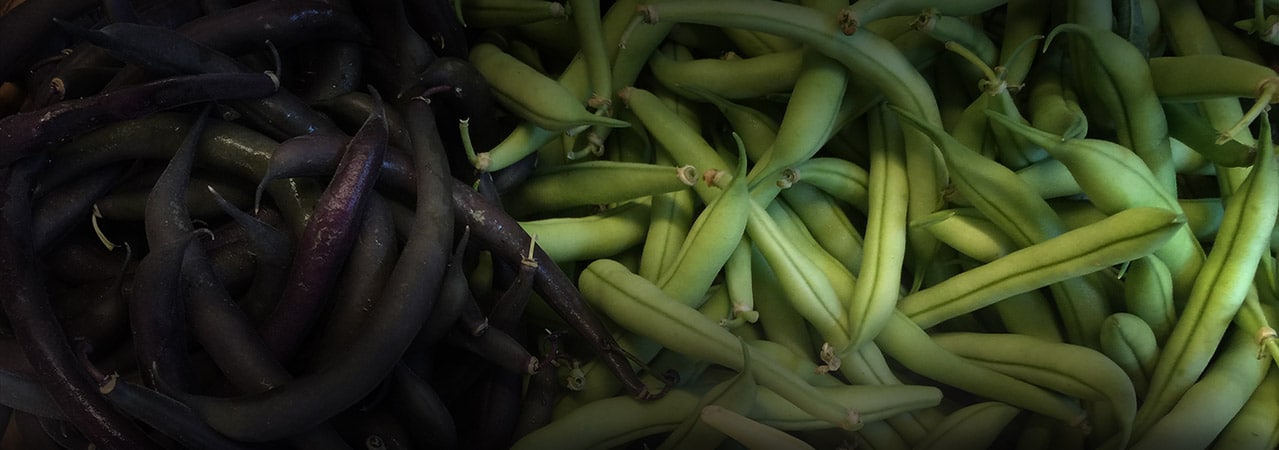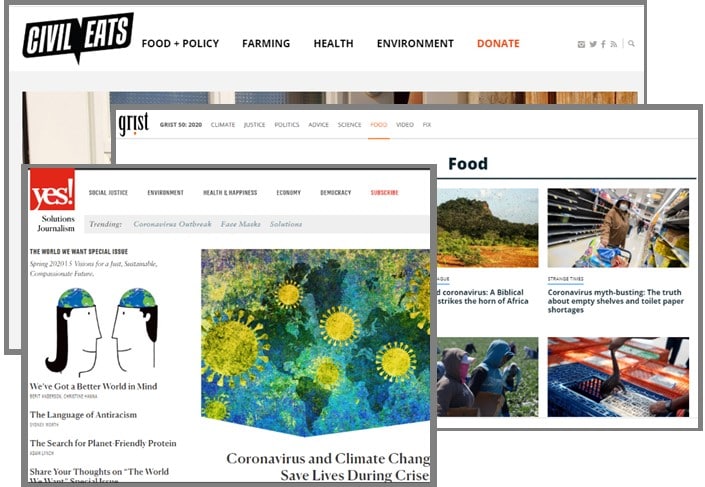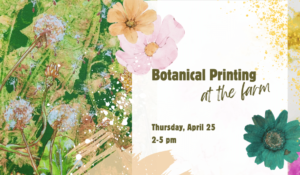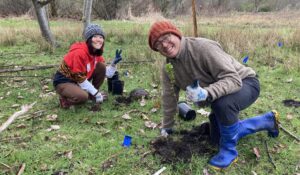
Inaugural Issue: Articles, Resources & Reads
Inaugural Issue: Articles, Resources & Reads
- posted on: April 15, 2020
- posted by: Robin Crowder
"*" indicates required fields

Hello all – At 21 Acres our email inboxes are full with interesting newsletters, academic research, intriguing articles and more. We find ourselves often wanting to share but we don’t want to inundate you. So, we’re starting with an occasional email and blog with the most relevant readings related to the local food economy, agroecology, regenerative farming and climate change. As always, we welcome your feedback. Please let us know what you find interesting, ask if you have questions, or share if you’d like to know more about certain topics. Subscribe to the email here.
Robin

Favorite Publications:
Do you know about Grist? It’s one of our favorite publications. They have a number of email newsletters that are always interesting, but one that we follow particularly carefully is, Climate in the Time of Coronavirus. Link
We also love Yes! Magazine. So many articles about hope and positive momentum. Link.
If you’re as obsessed with food issues as we are, check out Civil Eats, for interesting and well-researched article after article. Link
Regenerative Agriculture:
Case studies show how soil health practices increase farm profitability, Link
Evidence builds for economic and environmental benefits of soil health efforts, creating a library of on-farm examples for use by farmers and service providers across the country.
Hormone produced in starved leaves stimulates roots to take up nitrogen, Link
Scientists identify a hormone produced in nitrogen-starved leaves that stimulates roots to take up nitrogen from soil.
Farmworkers:
Food and Farmworkers Have Always Been Essential, Link
As essential workers, the people who grow, harvest, process, transport and sell the food we eat are more likely to get exposed to the coronavirus.
Essential but unwanted: Coronavirus reveals another American double standard, Link
Maybe nowhere has the onset of the pandemic spotlighted the hypocritical realities of modern American life more clearly than in the farm fields of Washington
Coronavirus:
Why food isn’t the problem with coronavirus, Link
By now, you’ve probably heard that the main way to avoid the coronavirus is to minimize contact with people, not food. Here are 3 reasons why that’s good advice.
Pandemic could empty Washington food banks in two weeks, Link
Government officials are worried about “trading one public health crisis for another,” as food supplies quickly disappear due to high demand
Climate Action:
Climate 101, Link
Free, hands-on activities, videos, and discussion questions about the planet’s most pressing issue.
Designing an end to a toxic American obsession: The Lawn, Link
If attitudes toward lawn care are shifted these grassy green patches represent a gigantic opportunity.
More pavement, more problems, Link
For every percentage point increase in roads, parking lots and other impervious surfaces that prevent water from flowing into the ground, annual floods increase on average by 3.3%.
Farmer Heroes Across the USA:
Many good things are happening all across the USA related to regenerative agriculture. We’ll share some of them on occasion. For example, Iowa Farmers Union is hosting a Lunch & Learn webinar series sponsored by Organic Consumers Association to help people hear directly from farmers about how they’re incorporating regenerative agriculture practices into their operations to build soil health, clean up Iowa’s lakes and rivers, produce nutrient-dense food – all while fighting global warming. Link
Youth:
New app aims to Reconnect Youth with Wonders of the Natural World, Link
Kids need more quality time outdoors: Studies and documentaries have highlighted that fact.
Community Resilience:
The Moment for Food Sovereignty is Now, Link
From panic planting to cooperative gardens, farmers focused on equity and food justice know that ‘if you can feed yourself, you can free yourself.’
Do you bake bread? You just might be a community activist, Link‘
By, for, and with the people’ studies exploring everything from crop pests to sourdough cultures are reshaping food and ag research.
How the Climate Change Generation Is Redefining Community, Link
Yes! Editors offer up their thoughts.
Getting real about rural resilience, Link
Rural areas are not monolithic or all in decline. Many are succeeding in innovative and creative ways
Waste:
Governor Signs Bill to Ban Single-Use Plastic Bags Statewide, Link
The legislation, which goes into effect on Jan. 1, 2021, bans retailers from giving out single-use plastic carryout bags and requires an 8-cent charge for other bags
Reusable Takeout Containers Aim to Take Out Trash, Link
People all over the world are looking for a local solution to single-use plastics for take out.
Food Safety:
3-Ways you can eat safely during the Covid-19 outbreak, Link
Center for Food Safety provides guidelines.
Things to Do:
If you find yourself with time on your hands, consider doing what Kelly Rankich, our facilities manager, has done: Following the advice in this article about how to remove yourself from mailing lists and eliminate junk mail. Link
Watch “The Migrant Kitchen” on PBS. It explores Los Angeles’ food scene through the eyes of a new generation of chefs whose cuisine is inspired by the immigrant experience. Link
Take an online course at a University. Cornell University has one that is free titled, The Ethics of Eating. Link
Listen to one or more of the Five Best Podcasts About Food. One of which is The Female Farmer Project, produced by Audra Mulkern, local photographer, author, advocate and public speaker.
Learn about gardening! There are so many resources available out there. Here’s just one from Rodale Institute that is good for kids and adults. Link
Watch a documentary. Here are 12 Amazing Documentaries on Sustainability and Regeneration.
Check out this resource: King County has created a beta-version Climate Change GIS Open Data portal for GIS professionals to support the use of spatial analysis in preparing for and adapting to the impacts of climate change.
Want to feel a sense of hope and that progress is being made locally? Sign up for Farm King County newsletters and learn about what’s happening close to home. Link
Just for Fun:
Why does your cotton towel get stiff after natural drying? Link
We wondered and thought you might be wondering too











 back to blog overview
back to blog overview








